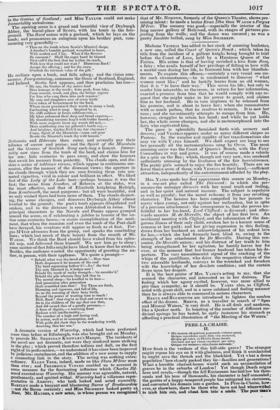Madame VESTRIS has added to her stock of amusing burlettas,
a new one, called the Court of Queen's Bench ; which takes its title from the incident of a gallant knight being brought to trial before the Court of Love, held by a Huntress Queen of the Fairies. His crime is that of having ravished a kiss from Rose, a fairy; who avails herself of her privilege of falling in love with a mortal once during her life, to fascinate him with her blandish- ments. To expiate this offence,—certainly a very venial one un- der such circumstances,—he is condemned to discover "what women most like;" and he luckily learns from an old woman, that it is "to have their way." This saves his life; but only to render him miserable, as the crone, in return for her information, exacted a promise from him that he would comply with any re- quest that she might make in his power to grant, and claims him as her husband. He in vain implores to be released from his promise, and is about to leave her; when she remonstrates with so much pathos, that he resolves to remain. It is now her turn ; and she incontinently attempts to escape from him. He, however, struggles to retain her hand; and while he yet holds her, the whole scene changes, and she is metamorphosed into the fairy who captivated him.
The piece is splendidly furnished forth with scenery and dresses; and VESTRIS appears under as many different shapes as Proteus. In the number and rapidity of her transformations she may vie with YATES himself. We shall expect ere long to see her personify all the metamorphoses sung by Ovfn. The moss amusing scene was the Court of Queen's Bench, with the Fairy Counsellors in wig and gown. It was of course made a vehicle for a quiz on the Bar; which, though not very new, was rendered sufficiently amusing by the liveliness of the fair barristeresses. The pretty girls seemed to enjoy the fun heartily. There are no fewer than a score of them; with "VEsrais at their head,—sufficient attraction, independently of the entertainment afforded by the play.
Mrs. YATES made her first appearance this season on Monday, in a one-act play called The Divorced; in which she per- sonates the unhappy divorcée with her usual truth and feeling, and in her quiet and natural manner. The subject is repulsive as well as painful ; but the moral redeems it from any revolting character. The heroine has been compelled by her parents to marry when young, not only against her inclination, but in spite of a previous attachment : the consequence is, that she proves un- faithful to her husband, Lord Clifford ; is divorced; and after- wards marries M. de Merville, the object of her first love. An accidental meeting with C/iford, and the information of the dan- gerous illness of their only child, awaken her to a keener sense of remorse at her guilt; and her giving expression to this feeling, draws from her husband an acknowledgment of his ardent love for her' —which she had formerly been blind to, owing to the strength of her attachment for De Merville. During this ren- contre, De Merville enters; and his distrust of her truth to him being strengthened by her agitation, he hastily leaves her for ever, at the moment that her former husband has taken his de- parture. The very unsentimental signal of the cracking of the whips of the postillions,- who drive the respective chaises of the two miserable husbands, conveys to the wretched and forsaken wife the knowledge of her desolate condition; and the curtain drops upon her despair. It is the best praise of Mrs. YATES'S acting to say, that she seemed the character, and. interested us in her distress. The feeling which her agony excited, however, was more allied to pity than sympathy, as it should be. YATES also, as Clifford,. acted with great skill, and in a more subdued and feeling manner than he is always able to command in serious characters. REEVE and BUCKSTONE are introduced to lighten the sombre effect of the drama. REEVE, as a traveller in search of "Spas and Mineral Waters," is very droll. He is all drab and nankeen, like a Quaker moth. In boasting of the number of different me- dicinal springs be has tasted, he aptly instances his stomach as affording a practical illustration of "the Meeting of the Waters."


























 Previous page
Previous page